Catholic

CANTERBURY, England — Women’s rights activists greeted with delight signs the Church of England is poised to relent and allow women to be consecrated as bishops.
Archbishop of Canterbury Justin Welby will preside over a historic General Synod meeting at the University of York when a make-or-break vote on the subject is expected July 14.
“I think we’re there at long last,” American-born Christina Rees, one of the church’s leading women’s rights campaigners, said in an interview Thursday.
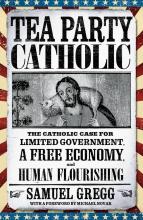
WHAT IS THE relationship between one’s religious beliefs and one’s economic and political views? Are some religious beliefs more “American” than others?
These questions come to mind in reading Samuel Gregg’s Tea Party Catholic: The Catholic Case for Limited Government, a Free Economy, and Human Flourishing. Gregg suggests that religion directly informs—or should inform—our understanding of political and economic issues and that religious, economic, and political liberty are inextricably bound. A perceived or real “attack” on one, he contends, is an attack on all.
Gregg is director of research for Acton Institute, a libertarian think tank whose core principles seek the “integrating [of] Judeo-Christian truths with free market principles.”
In Tea Party Catholic Gregg writes of a “new type of Catholic American” who is grounded in a “dynamic sense of orthodoxy” but whose “Americanness” is defined by faith in free market principles. Tea Party Catholic details how free market principles and a view of government “with clear but constrained economic functions” have, Gregg argues, not only deep roots in U.S. political history but also in Catholic tradition. Thereby, he suggests, any U.S. Catholic differing in his or her economic and political beliefs has neither a proper understanding of the United States’ founding nor of the teachings of the Catholic Church.
Gregg’s attempt to sacralize libertarianism is not consistent with Catholic doctrine: It runs counter to stated positions of the Vatican and the majority of Catholic theologians and economists. At a recent conference at The Catholic University of America one of Pope Francis’ advisers, Cardinal Oscar Rodríguez Maradiaga, said that in commenting on free market and libertarian influences on our global economy, Pope Francis gave a “sharp prophetic verdict: ‘This economy kills.’”
Another Christian school moves to divest – this time, a Catholic university
Just one week after Serene Jones, President of Union Theological Seminary, announced their decision to become the world’s first seminary to divest from fossil fuels, another first announced. The University of Dayton, a Catholic, Marianist university, will divest fossil fuels from its $670 million investment pool. This is the first Catholic university in the world to do so.
Just as divestment makes sense for Union Theological Seminary and its history of engaging social justice, this choice is in line with Catholic social teachings and the Marianist values of leadership and service to humanity. Marianists view Mary, the mother of Jesus, as their model of discipleship, and their mission is to bring Christ into the world and work for the coming of Christ’s kingdom.
Union and the University of Dayton are the newest schools joining the growing list of U.S. colleges and universities divesting from fossil fuels as a way to stop financially supporting the climate pollution and the public health implications of coal, oil, and natural gas as the dominant sources of energy in the country. Their announcements are unique because they speak not only of the moral choice, but of the Christian choice on matters of financial investment.
At the Presbyterian Church (USA) General Assembly this past week, in addition to the denomination’s decision to divest from three companies in relation to conflict in Israel/Palestine, a decision was made to begin the discernment process on fossil fuel divestment. The fossil fuel divestment conversation is happening in many churches and religious institutions across the country, and Union Theological Seminary and the University of Dayton are clear that they see this as an act of Christian witness for protecting God’s creation and people.
Information is from The University of Dayton’s website.

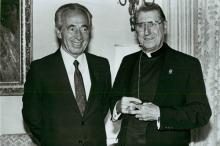
In April 1908, Dorothy Gumple, a 19-year-old Jewish woman living in Connecticut, converted to Roman Catholicism. Less than two years, later she married a Catholic immigrant from Ireland. They and their five children lived in Philadelphia where her husband was a lifelong trade union member. It is not exactly the stuff global news stories are made of.
Except this: Their fourth child became the world-famous archbishop of New York, Cardinal John J. O’Connor, who served in that position from 1984 until his death in 2000.
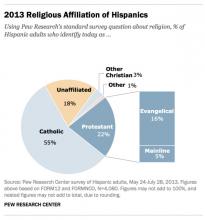
The Pew Research Center’s look at “The Shifting Religious Identity of Latinos in the United States” also examined their beliefs, behavior, and views on social issues. It finds that, beyond the church doors in the lives of the faithful, there are distinct differences between Hispanic evangelicals and Hispanic Catholics:
Catholics are less likely than evangelicals to:
- Attend services weekly — Catholic, 40 percent; evangelical, 71 percent
- Pray daily — Catholic, 61 percent; evangelical, 84 percent
- Take a literal view of the Bible — Catholic, 45 percent; evangelical, 63 percent
- Think abortion should be illegal in all/most cases — Catholic, 54 percent; evangelical, 70 percent
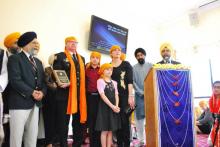
Brian Murphy attended Catholic Mass regularly, both before and after he took 12 bullets while trying to defend a Sikh temple in Wisconsin from a gunman in 2012.
But he says the principles he’s learned from the Sikh temple have helped his recovery.
Now, a Maryland-based Sikh organization has honored the retired police officer for his service when a gunman killed six worshippers at the Sikh Temple of Wisconsin.
The Guru Gobind Singh Foundation, a Maryland-based Sikh advocacy organization, honored Murphy on Sunday — on Vaisakhi Day, a Sikh holy day — with a Sewa (service) Award, given annually to someone who has contributed to the Sikh community.


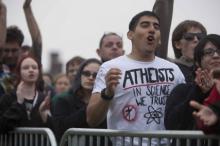
In recent surveys, the religious “nones” — as in, “none of the above” — appear to lead in the faith marketplace. In fact, “none” could soon be the dominant label U.S. adults pick when asked to describe their religious identity.
And, researchers say, this is already making nones’ attitudes and opinions less predictably liberal on social issues.

Last fall, on a Sunday afternoon, as I walked out of the church, a young man tugged on my Franciscan habit. It was Miguel, a member of our Latino choir.
“Father,” he said, “please, pray for the people of my home parish back in El Salvador, especially for one of the priests who has received death threats.”
Startled, I asked: “What is happening there?"
“These priests are organizing against the multinational companies,” he said. “The companies are looking for gold. What will be left for our people? Only poisoned water, a wasteland, and death.”
A few weeks later, I had another similar conversation with a group from Guatemala. Theirs was a similar tale of how indigenous communities were being threatened by mining projects.
As a Catholic and a member of the Franciscan Order, I believe that we are called to “read the signs of the times” and to listen to the cry of the poor and the “groaning” of God’s Creation.






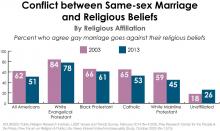
Americans’ attitudes toward the lives and choices of gays and lesbians have changed radically since Massachusetts first legalized same — sex marriage a decade ago.
A new survey finds a significant shift toward tolerance across every religious, political, and age group and every region of the country, said Robert P. Jones, CEO of the Public Religion Research Institute. PRRI’s survey, released Wednesday, reveals the ramifications of these changes in family, church, and community life.
“Only the issue of marijuana looks anything like this in terms of rapid movement in favorability,” Jones said. “But with that one exception, it’s unusual to see this much change in a relatively short amount of time.”
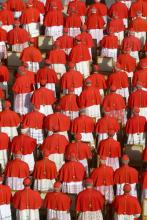
IN MINDANAO, Philippines, a cheer went up: Mayron tayong cardinal! (“We have a cardinal!”) In January, Orlando B. Quevedo, archbishop of Cotabato, was one of 19 new cardinals named by Pope Francis.
Cardinal Quevedo rose from newsboy to archbishop. He’s renowned for his interreligious work and cofounding a Catholic-Muslim peace community in the southern Philippines where there is violent ethnic conflict. Quevedo is a leader in the Federation of Asian Bishops’ Conferences, a body representing more than 100 million Catholics that has courageously pushed forward the values of Vatican II amid traditionalist backlash.
During a papal conclave, when a new pope is chosen, much of the world, Catholic and otherwise, pays close attention to the news ticker from the Vatican. For the selection of new cardinals, not so much. But with Francis, everything bears watching.
Historically, cardinals were called “the princes of the church” because of the power they wielded. Functionally, they serve in the College of Cardinals, which meets with the pope to deal with questions of major importance and elects new popes. Sadly, scoring a red hat has been for some the acme of clerical ambition. The season of cardinal picking can devolve into extravagant indulgence.
But, there’s a new sheriff in town: Pope Francis wants deputies, not darlings.
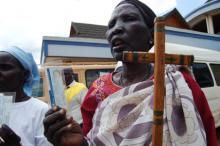
For Christians living in predominantly Muslim Sudan, travel restrictions are making life more difficult each day, a Roman Catholic cardinal said.
Sudanese Cardinal Gabriel Zubeir Wako highlighted the challenges at a Catholic Bishops Conference in Juba, the Republic of South Sudan’s capital. His auxiliary bishop could not attend the Jan. 21-30 meeting because his passport was seized by security agents, along with those of eight priests.
“Christians in the two countries are facing difficulties,” Wako told the gathering. “We [bishops] must focus on serious matters and come up with strong messages.”